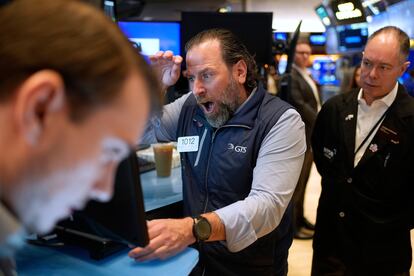Global markets panic over Trump’s trade war
Wall Street slides nearly 10% in two days and drags down all the world’s stock markets. Experts say the key lies in whether the levies are ideological or a bargaining chip

It was a historic session in the international trading floors. With the stock markets still trying to assimilate the violent protectionist shift by the U.S., the retaliatory measures announced by China have fueled the possibility of a trade war on a global scale that could lead to a recession. Thus, although the new tariffs have not yet come into force and tough negotiations are expected, investors have already pressed the panic button as a precautionary measure.
After Wall Street experienced its worst session in five years on Thursday, the losses continued on Friday with a 5% drop that extended the fall to 10% in just two trading sessions. The tension was not helped by the words of Federal Reserve Chairman Jerome Powell, who said that “it is now becoming clear that the tariff increases will be significantly larger than expected, and the same is likely to be true of the economic effects, which will include higher inflation and slower growth.”
The European stock market, which in March experienced its particular moment of glory due to expectations of higher economic growth, is now infected by pessimism. The German Dax fell by 4.65%, the Euro Stoxx 50 by 4.6%, the French Cac by 4.3%, the British FTSE by 5% and Spain’s Ibex 35 by 5,83%. In the Spanish case, the drop is only comparable to historical moments like the outbreak of the Covid pandemic (-14%), the victory of Brexit (-12%), the fall of Lehman Brothers or the darkest days of the euro crisis.
The shock has been felt in all markets: commodities, currencies and debt. As investors sold stocks, they accelerated their purchases of safer assets such as bonds and gold. Fears of an economic slowdown have taken their toll on Brent, which falls to $65, its lowest level since April 2021, while the euro consolidates its position at $1.09.
UBS analysts acknowledge that the tariffs are much worse than expected, but believe that the reaction of the last few days is exaggerated. “The key is to decide whether the levies are ideological or a bargaining chip,” they note. “If they are ideological, then we could find ourselves in a worst-case scenario, which cannot be excluded.”
Sign up for our weekly newsletter to get more English-language news coverage from EL PAÍS USA Edition
Tu suscripción se está usando en otro dispositivo
¿Quieres añadir otro usuario a tu suscripción?
Si continúas leyendo en este dispositivo, no se podrá leer en el otro.
FlechaTu suscripción se está usando en otro dispositivo y solo puedes acceder a EL PAÍS desde un dispositivo a la vez.
Si quieres compartir tu cuenta, cambia tu suscripción a la modalidad Premium, así podrás añadir otro usuario. Cada uno accederá con su propia cuenta de email, lo que os permitirá personalizar vuestra experiencia en EL PAÍS.
¿Tienes una suscripción de empresa? Accede aquí para contratar más cuentas.
En el caso de no saber quién está usando tu cuenta, te recomendamos cambiar tu contraseña aquí.
Si decides continuar compartiendo tu cuenta, este mensaje se mostrará en tu dispositivo y en el de la otra persona que está usando tu cuenta de forma indefinida, afectando a tu experiencia de lectura. Puedes consultar aquí los términos y condiciones de la suscripción digital.









































